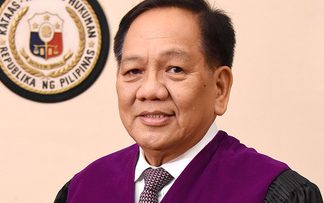DESPITE her achievements and accolades, she refuses to be flattered, and insists her achievements are mere products of chance and by a person who just happened to be at the right place at the right time.
Now 77 and retired from journalism, Eugenia Duran Apostol, the founding publisher of the Philippine Daily Inquirer and the Outstanding Thomasian Alumni Award for the media honoree in 1999, became the first recipient of the UP Gawad Plaridel last July 4 at the Hyatt Regency Hotel in Pasay City. The University of the Philippines gives the award to a media practitioner who best exemplifies professional integrity in the interest of public service, much like hero Marcelo del Pilar’s, after whose nom de plume the award was named.
Formally launched last January 22, the UP Gawad Plaridel garnered 12 nominations of the country’s top journalists who went through the initial screening process conducted by a committee of eight UP College of Mass Communications (CMC) professors. After the initial deliberations last April, the nominees were shortlisted to three.
Nominated by the Varsitarian, Apostol bested the two other nominees for the award during the final deliberations as she received the nod of the three judges—Yvonne Chua of the Philippine Center for Investigative Journalism, sociologist and columnist Randolf David, and noted broadcast journalist Cecilia Lazaro.
In her acceptance speech, Apostol recounted the experiences that made her a product of chance. She said when she was around three or four year old, she would have been kidnapped if not for an observant townmate who grabbed her from a woman who tried to lure the little girl from her hometown in Sorsogon.
From that time on, Apostol said it has always been a case of “being at the right place at the right place” for her.
“Pagkat siya nga’y likha ng mga ‘di sinasadyang pagdudugtong-dugtong ng mga pagkakataon, nagkataon ding alam niyang ‘sakto’ kung kani-kanino magtatanong tungkol sa tatlumpung mansion at ‘di mabilang na mga kalaguyo ni Erap noon,” said Apostol as she retold her “luck” regarding the Pinoy Times exposés on the alleged “money, mansions, mistresses.”
She also paid tribute to her alma mater, UST, which she said played a big role in molding del Pilar into the hero now emulated by Filipinos, especially journalists. Del Pilar was famous for his role as editor in chief of the revolutionary newspaper La Solidaridad, which lobbied for the better treatment of Filipinos by the Spanish conquistadores.
“For 16 years, Marcelo H. del Pilar studied under Dominican priests, first at the (Colegio de San Juan de) Letran, then at the (University of) Santo Tomas, where he graduated with a bachelor’s degree in Philosophy and cultivated the love for country,” Apostol said in Spanish as she acknowledged the presence of UST Secretary-General Fr. Isidro Abaño, O.P. and Regent Fr. Lucio Guttierez, O.P. of the Faculty of Arts and Letters in the audience.
Apostol graduated magna cum laude from UST in 1948 with a degree in Litt. B in Journalism.
UPCMC dean Dr. Nicanor Tiongson said Apostol deserved the award since she exhibited the qualities a journalist should have—one who patiently writes, edits, and publishes a work in accordance with the highest standards of print media without bias and fear.
“Si Eugenia Duran Apostol ang di-mapasusubaliang pruweba na kung may tapang, tatag ng loob at abilidad ang mamahayag, mananaig pa rin ang midyang malaya, mapanuri, at mapagpalaya, kahit sa pinakamapaniil na kundisyon ng lipunan,” he said.
In her five-decade long career, Apostol pioneered coverage and publishing innovations that upheld women’s empowerment and press dissent.
As a budding writer and editor, she joined The Commonweal (which later became The Sentinel), The Sunday Times of The Manila Times, and the Sunday supplement Women & Home of the The Manila Chronicle.
In the 1970’s, she played a hand in the establishment of critical women’s magazines in Woman’s Home Companion and Mr. & Ms.
When Martial Law started killing press freedom, Apostol was the last person standing.
She used her magazine Mr. & Ms. to publish articles that responsibly criticized the Marcos regime. And when President Marcos cast his iron hand upon the Philippine press killing the coverage of the Ninoy Aquino assassination, again, her Mr. & Ms. unraveled the truth every Filipino thirsted for.
As President Marcos announced in December 1985 the holding of a snap election in February 1986, she turned the Philippine Weekly Inquirer into the broadsheet the country now knows as the Philippine Daily Inquirer. The Inquirer would later help spur the change the country needed with its comprehensive and fearless coverage of events leading to and after the 1986 elections.
In 1994, Apostol left the chairmanship of the Inquirer board of directors. Afterward, she set up the Foundation for Worldwide People Power, a group she established to carry on the ideals of the 1986 People Power Revolution, in 1998.
In 1999, Apostol sprung back into press action and established the Pinoy Times, a weekly tabloid published in Filipino, to counter President Estrada’s oppression of press freedom. Later, the tabloid would be instrumental in opening President Estrada’s Pandora’s box of unexplained wealth and a big number of mistresses and mansions that led to his impeachment and subsequent ouster from the presidency by another popular revolt.
Despite retirement, Apostol still fights for press freedom in a thousand other ways. For her contributions to Philippine print media, she will always be remembered as the journalist who trod the path no one else dared to walk. Teodoro Lorenzo A. Fernandez
















